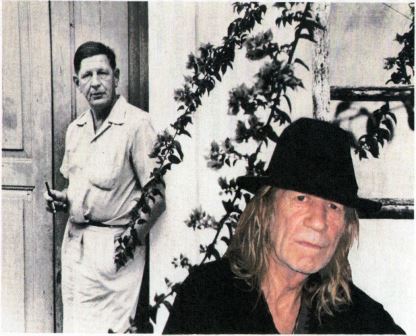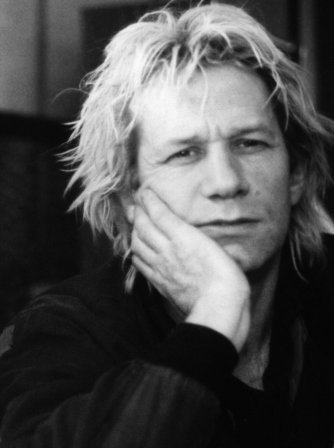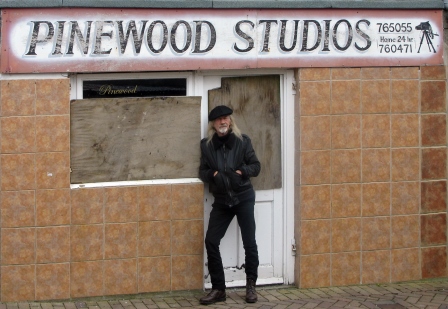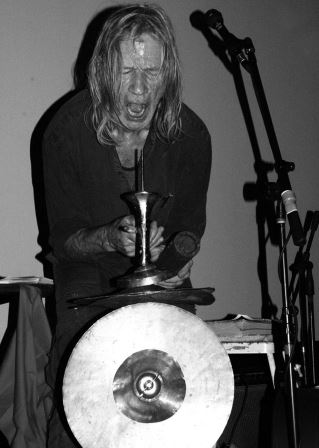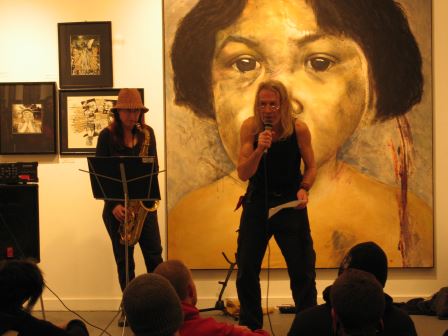
| |||||
|
Penny Rimbaud is someone who Iíd been dying to talk with since I first heard Crass when I
was twelve. This interview shows what a dynamic and humble person Penny can be. We talk
about poetry, politics, music, meditation, and of course, bread. His work transcends punk
and reaches toward the human core of artistic expression. He was an absolute joy to
interview. Hope you enjoy the read!
|
Penny Rimbaud: Iíve spent most of today rebuilding the chicken run because weíve got
foxes in the area and going over some poems of Wilfred Owen which Iíll be doing a recital
of later in the year. Thatís all Iíve been doing, reading, writing, and meditating. The
best news about the house is that weíve almost paid off everything that we owed on it for
the better part of ten years and weíre now about to start the process of setting up a
trust so that we can turn it into a state institution for the radical arts. Itíll be held
as close as it can be to perpetuity and hopefully have a long life beyond that of the
three current residents as a center for activism and the arts.
Punk Globe: In the beginning, did you have any misgivings about Dial House becoming a
state institution?
Penny Rimbaud: No, not at all. We live in the state, like it or not. If I can oblige the
state to take on an institution of learning, peace, wisdom, and joy, Iím pleased to do
that. Weíre not going to change the state by standing outside of it and shaking our
fists. Weíre going to change it through our profound belief in kindness. Itís about using
the power of the state to make it change itself. Weíre all responsible; thereís no point
in wagging fingers and blaming others. What can you do thatís practical and helps others
as well as yourself? Iíve spent fifty years trying to demonstrate my way of doing that,
and if that becomes part of the body of the state, fantastic. Bit by bit, thatís how itís
all changing.
Penny Rimbaud: No, I donít do much work with activists over there. Itís my few days off a
year where I wander around, sit in cafťs, and maybe write down a note on a napkin here or
there. Last year, we got involved with a group of anarchist printers and I did a reading
using the printing presses as backing music. My mind is always working on stuff, but I
consider that my time off.
Punk Globe: What do you think are the biggest benefits of taking time off?
Penny Rimbaud: You get a perspective. I think that one can become very dug-in on oneís
own domain. My domain happens to be England, itís just Dial House, but all of Britain.
Being out of oneís own culture is always valuable. I can understand a small amount of
Spanish, but I donít understand the whole social set-up. If Iím in England, I can read
every face and every action and understand whatís going on. Being outside of that helps
me be a freer person for a while. I can also take stock of things and look at what Iím
doing in life from a distance. There are a few things that are constant in my life and
thatís my great faith in life, my love of and devotion to life, and my view of death as
an exact mirror of life. I carry that with me wherever I go. The day-to-day things of the
material world can sometimes be seen better if youíre not living in the middle of it.
Having the time to assess whatís important makes practical decisions easier because
youíre not actually weighed down with all of it.
Punk Globe: Have you made any effort to make Dial House accessible to travelers?
Penny Rimbaud: Not really. As a human experiment about fifty years ago, I removed the
locks of the door. Iím still seeing whatís happening. Iím not advertising it or trying to
get anything from it, Iím allowing it to make its own demands in its own way. I made that
decision and Iíve stuck to it faithfully. It wouldnít be in my nature put out ads, people
find their own way here in large numbers. I can share time or not share time with them.
Itís not a social center in that sense. Iím working all the time, whether itís writing
poetry or making bread. Thereís no difference between work and play. I decided fifty
years ago to be here now.
Punk Globe: A lot of what youíre saying reminds me of Alan Watts, can you speak to his
influence at all?
Penny Rimbaud: Yeah, I first started reading Watts when I was 18. It inspired me greatly:
I donít think influence is quite the right word. His work, the Beat poets, and what was
happening in the Ď60s in the West End of London all really inspired me. It was the whole
DIY essence of all of that, especially Gary Snyderís work, which struck a chord with me.
The finding of oneself within nature was very inspiring to me. It was a new attitude;
they were showing us a different way to live.
Punk Globe: Have you crossed paths with Gary Snyder at all?
Penny Rimbaud: Not Snyder, no. I did a reading last year at City Lights bookshop and
Ferlinghetti was going to come, but heís an old guy now and he wasnít well. If Iíd been
on the West Coast for a bit longer, I would have tried to make contact with Snyder, but I
was flying in, doing the reading, and flying out. I canít afford to do otherwise.
Punk Globe: How do you approach revising your poems?
Penny Rimbaud: Iím never deliberate. An idea or vision appears and I translate that into
words. I donít depend upon my reasoning intellect to write; itís a much more intuitive
process. I might get up in the morning and think Iím going to write a poem, but Iíll sit
at my desk, and ten minutes later, Iíll be off chopping wood or feeding chickens. I donít
feel thereís any difference. Thereís youíre doing when youíre writing poetry that youíre
not doing when youíre making bread. The poetry comes from something deeper that wants to
express itself and ask its own questions. I always start in a notebook with a pen or a
pencil. When Iím happy with that, I type it up. There I might play with the shape or the
aesthetic of the poem. Change a line break, add in a rhyming line, and get it solid. Iím
not bothered about whether itís good or bad, but about whether itís true to what I feel.
Punk Globe: What was the process like for the poem, ďOh, AmericaĒ specifically?
Penny Rimbaud: I wrote ďOh, AmericaĒ right when I had the idea. It happened and came out.
Gee had this gig showing one of her films at a prestigious concert hall in London and she
asked me to do something and this poem suddenly came to me. I wrote that subconsciously
to fit to a piece of music which is often used at military marches in America. When I
realized that, I thought it was the right music to use in a criticism of the American
state. I write out of the same necessities that I make bread out of. I make bread because
I need to eat, which feeds my stomach. I write poetry because it feeds my heart and soul.
Punk Globe: Thatís really beautiful. Did you have the same philosophy when you were
drumming in Crass?
Penny Rimbaud: Very much so. It was expressed in a different way. It was just Steve and
me for the first six months or so. Steveís got a different take on the world from the one
I have. In a way, I translated my feelings into his energy. I come from a privileged
background. From that, I knew things could be better and more equal. Iíve used the
education Iíve been given to try and undermine the upper class. ďActs of Love,Ē which I
did in the last year of Crass carried very much the same philosophy that I continue to
express in different words. I wrote ďItís You Who Makes The World Go ĎRound,Ē in the late
í60s, which was the same idea as ďThere Is No Authority But Yourself,Ē inspired by Alan
Watts, as you pointed out and by George Harrison. Everything I did in Crass was inspired
by the idea of ďbe exactly who you want to be,Ē which we put into the song ďBig A, Little
A,Ē a practice of helping people to think about a world that they might like to see, to
show them that they had the power to change a world where theyíd been told they hadnít.
One of the things I picked up from Alan Watts and that perspective on Eastern philosophy
was the practice of karmic yoga, a yoga of service which shows that thereís no greater
entity to help you but yourself. That devotion, that service is part of what keeps me
going.
Punk Globe: When you mentioned George Harrison, I thought of the Beatles art contest that
you won in the early sixties. Did you get to talk to him at all?
Penny Rimbaud: I was meant to go to dinner after the show with the group, but I just
wanted to get back to my mates at art school. Iíd spent all day in the studios and it was
really busy because The Beatles were beginning to become the absolutely massive band that
they became. The whole show was a very over-excited, rowdy business. I was going to get
the records signed and all that, but I thought, ďAh, fuck it. I want to get back to my
friends.Ē I laughed it off. Iíd gone off The Beatles by then because I thought they were
too commercial, but my younger sister was a member of the fan club. I entered that
contest with the idea that I was going to win. I donít know where I got that idea,
because there were thousands of entries. Iíd invited my sister to come up and meet them,
but she couldnít because she was at convent school. She was doing a choir performance
that night. The chief nun in the convent arranged for the entire choir to watch the event
on television before they performed.
Punk Globe: How and when did you first come up with that archetype of the Glaswegian
fourteen year old that Iíve heard you refer to?
Penny Rimbaud: During Crass, we were traveling around the U.K. Weíd given up touring
abroad because we thought people werenít understanding what we were on about. They were
treating us too much like a rock band. Dial House is fairly close to London and this
whole area is very affluent. There is poverty here, but very little of it. The further
you go north in Britain, the more poverty youíll see. In Glasgow, it was extreme. Itís
one of the poorest cities in Britain. We played several gigs in Glasgow and there was
this group of fourteen year old kids whoíd spiked up their hair to make it look punky.
They were really sweet and they all wanted to meet Eve. They rushed over to her and
immediately connected. When I saw that, I thought, ďThis is why weíre doing this.Ē Before
I made a decision, Iíd keep myself in check by asking myself if those kids would do the
same. We were being offered these big record deals. If we had wanted to, we could have
signed with any label. We could have done gigs in massive theaters. We were turning that
down all the time. People would ring up and ask why we didnít play in their area. Weíd
tell them, ďYou arrange it and weíll come do it.Ē We would only play in workingmenís
clubs or youth clubs. Occasionally, weíd play a pub or a small theater. Our gigs were
small, that way it wasnít intimidating. Kids in Glasgow might be intimidated by a big
theater with stage lights and bouncers. It was a way of breaking that whole rock star
mentality and not getting carried away with the possibilities.
Penny Rimbaud: There wasnít any temptation at all. There was always a possibility that
weíd get carried away in our own sense of power. When a following grows up around you,
itís not difficult to misuse it. We were planning a massive march, which might have
gathered together several thousand people in protest of nuclear proliferation. We were
going to go from north to south and stop at each of the nuclear installations in Britain
and end up in London. We, as a band, could have gotten in our van and fucked off if
things got too dangerous. If youíre planning something that large and creating huge
bodies of people, you need to be responsible for each oneís safety and well-being. We saw
that it could create some really messy conflict, so we scrapped it. This was following
the city riots which we had been involved in. Those didnít lead to too many arrests, so
we thought we might be able to plan something bigger. Again, it comes back to the
fourteen year old Glaswegians and what theyíd be able to do.
Punk Globe: Do you have other ways besides the fourteen year old Glaswegians of checking
yourself?
Penny Rimbaud: For the past few years, Iíve been trying to balance how much I do for
myself and others. The lily grows and gives its perfume, but itís not aware that itís
giving off such pleasure. I ask myself if I was after something after I do it. When I
analyze it and find self-interest in it, I say ďOkay, Penny, learn the lesson.Ē Itís like
programming a computer. If you hit the right buttons in the human brain, you can rewire
yourself. Itís hard work. Itís easy for me to say this kind of thing because I donít get
on the subway every day and see all the adverts and interact with all the people. Iím not
watching television or reading the newspapers or doing any of the things that could
distort my sense of beauty.
Penny Rimbaud: Anger can be beautiful if itís righteous. Youíve got to be really
conscious of how youíre using it in a particular situation or dialog. When I was caring
for my dying mother, the only way I could get her to respond was to slap her in the face.
She was suffering from brain cancer. She was tearing at herself in these explosive fits
of rage and tears. I only did it once and I hated myself for doing it, but it stopped her
from hurting herself more. Did I do it because I was pissed off? I think so on some
level. When she became overpowered by her rage, she got potentially dangerous to herself
and to me. If itís not malicious, it can sometimes be kind to express anger. It can be a
useful tool, but it needs to be used sparingly.
Punk Globe: Did righteous anger play into some of your work with Crass?
Penny Rimbaud: Of course, thatís an aspect of it. Personally, I was never afraid of
nuclear war. If it happened, it happened. I think people become so easily intimidated and
lose their joy of life too quickly. I used the nuclear bomb as a metaphor to say, ďLook,
this is how you might imagine it, but what are you gonna do about it?Ē As I explained
earlier, my relationship with Steve enabled to me to phrase that in a kind of street
language that could help me get through to my target audience. When I was a kid, I was
listening to blues records and I could see that the people who made those records were
coming from a very earnest place and playing what they felt.
Punk Globe: Allen Ginsberg called that ďstreet language,Ē kitchen talk. Would you agree
with that?
Penny Rimbaud: Yeah, I think so. It wouldnít be the talk in my kitchen, I like to be
alone and in my own space when I cook. There was an arts movement called the kitchen sink
artist and their work was very gritty and harsh with a working class ethic.
Punk Globe: Are you still in touch with Steve? Whatís your relationship like with him
now?
Penny Rimbaud: Eve and I decided weíd go to his last gig he played with his band. I see
him every so often, maybe six or seven times a year. Weíve got different interests, but
we still love each other a lot. We donít have a great deal to say, but we always reaffirm
our love and respect for each other.
Punk Globe: Do you see Sid and Zillah from Rubella Ballet often?
Penny Rimbaud: Sidís been really ill, so they havenít come over recently, but they come
over when they can. Sid took the same route I did in treating his cancer with homeopathic
medicine.
Punk Globe: My favorite Crass album ďPenis Envy,Ē is a piece IĎve wanted to ask you about.
How did that come about?
Penny Rimbaud: It started when Crass was being viewed as a boot band. All-male,
aggressive, and masculine. The women in the group had always been a huge part of what we
were about and they seem to be getting the short end of the stick. So, we went ahead and
made a feminist album. The music was slightly different because it was centered on
womenís voices. We were saying very different things. It was very radical at a time when
that sort of message didnít find its way onto vinyl. It was powerful feminist statement.
The only other band that anywhere near matched it were Poison Girls, who were a very
powerful feminist outfit.
Penny Rimbaud: Make bread. I went on a silent retreat thinking I was going to get
instruction about meditation and learn all sorts of things. I turn up and the head of the
retreat told us we were going to sit. I thought, ďOkay, what else are we going to do?Ē
That was it, that was the whole instruction. After that, we sat, looked at a wall, and
there was no one telling me what to do, say, or think. We got what was called a Dharma
talk every day and Iíll say what he said to me. Just sit. Allow yourself to get out of
the way of yourself. Spread that joy of life.
|
|
|
